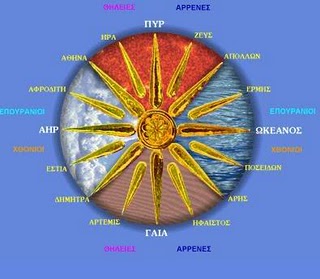Odysseus (Οδυσσεύς), also known by the Latin name Ulysses (Latin: Ulyssēs, Ulixēs), was a legendary Greek king of Ithaca and a hero of Homer's epic poem the Odyssey. Odysseus also plays a key role in Homer's Iliad and other works in that same epic cycle. Husband of Penelope, father of Telemachus, and son of Laërtesand Anticlea, Odysseus is renowned for his brilliance, guile, and versatility (polytropos), and is hence known by the epithet Odysseus the Cunning (mētis, or "cunning intelligence"). He is most famous for the ten eventful years he took to return home after the decade-long Trojan War. This war was a civil war among Greeks from european regions(Greece) ang Greeks from asiatic regions of Greeks((Turkey). They had the same language, the same national origin and worship the same gods.
Odysseus was one of the most influential Greek champions during the Trojan War. Along with Nestor and Idomeneus he was one of the most trusted counsellors and advisors. He always championed the Achaean cause, especially when the king was in question, as in one instance when Thersites spoke against him. When Agamemnon, to test the morale of the Achaeans, announced his intentions to depart Troy, Odysseus restored order to the Greek camp. Later on, after many of the heroes had left the battlefield due to injuries (including Odysseus and Agamemnon), Odysseus once again persuaded Agamemnon not to withdraw. Along with two other envoys, he was chosen in the failed embassy to try to persuade Achilles to return to combat.
When Hector proposed a single combat duel, Odysseus was one of the Danaans who reluctantly volunteered to battle him. Telamonian Ajax, however, was the volunteer who eventually did fight Hector. Odysseus aided Diomedes during the successful night operations in order to kill Rhesus, because it had been foretold that if his horses drank from the Scamander River, Troy could not be taken. After Patroclus had been slain, it was Odysseus who counselled Achilles to let the Achaean men eat and rest rather than follow his rage-driven desire to go back on the offensive—and kill Trojans—immediately. Eventually (and reluctantly), he consented.
During the funeral games for Patroclus, Odysseus became involved in a wrestling match with Telamonian Ajax, as well as a foot race. With the help of the goddess Athena, who favoured him, and despite Apollo's helping another of the competitors, he won the race and managed to draw the wrestling match, to the surprise of all. Odysseus has traditionally been viewed in the Iliad as Achilles's antithesis: while Achilles's anger is all-consuming and of a self-destructive nature, Odysseus is frequently viewed as a man of the mean, renowned for his self-restraint and diplomatic skills. He is more conventionally viewed as the antithesis of Telamonian Ajax (Shakespeare's "beef-witted" Ajax) because the latter has only brawn to recommend him, while Odysseus is not only ingenious (as evidenced by his idea for the Trojan Horse), but an eloquent speaker, a skill perhaps best demonstrated in the embassy to Achilles in book 9 of the Iliad. The two are not only foils in the abstract but often opposed in practice since they have many duels and run-ins. Perhaps Odysseus' most famous contribution to the Greek war effort was devising the strategem of the Trojan Horse, which allowed the Greek army to sneak into Troy under cover of darkness. It was built by Epeius and filled with Greek warriors, led by Odysseus. Odysseus is probably best known as the eponymous hero of the Odyssey. This epic describes his travails, which lasted for 10 years, as he tries to return home after the Trojan War and reassert his place as rightful king of Ithaca. Returning to Circe's island, they were advised by her on the remaining stages of the journey. They skirted the land of the Sirens, passed between the six-headed monster Scylla and the whirlpool Charybdis, where they rowed directly between the two. However, Scylla dragged the boat towards her by grabbing the oars and ate six men.
They landed on the island of Thrinacia. There, Odysseus' men ignored the warnings of Tiresias and Circe and hunted down the sacred cattle of the sun god Helios. Helios told Zeus what happened ordered for Odysseus' men to be punished or else he would take the sun and shine it in the Underworld. Zeus fulfilled Helios' demands where he caused a shipwreck during a thunderstorm in which all but Odysseus drowned. He was washed ashore on the island of Ogygia, where Calypso compelled him to remain as her lover for 7 years before he finally escaped upon Hermes telling Calypso to release Odysseus. Odysseus departs from the Land of the Phaeacians. Painting by Claude Lorrain Odysseus finally escapes and is shipwrecked and befriended by the Phaeacians. After telling them his story, the Phaeacians led by King Alcinous agree to help Odysseus get home.
They deliver him at night, while he is fast asleep, to a hidden harbor on Ithaca. He finds his way to the hut of one of his own former slaves, the swineherdEumaeus, and also meets up with Telemachus returning from Sparta. Athena disguises Odysseus as a wandering beggar in order to learn how things stand in his household.
Πηγη: https://en.m.wikipedia.org/wiki/Odysseus
Εκπαιδευτικό Ιστολόγιο με στόχο την ενημέρωση για την Μυθολογία, την Προϊστορία, την Ιστορία και τον ελληνικό πολιτισμό greek.history.and.prehistory99@gmail.com
Ελληνική ιστορία και προϊστορία

Ελληνική ιστορία και προϊστορία
Σάββατο 4 Ιουλίου 2015
Odysseus - The most intelligent among the Greeks
Εγγραφή σε:
Σχόλια ανάρτησης (Atom)

Δεν υπάρχουν σχόλια:
Δημοσίευση σχολίου